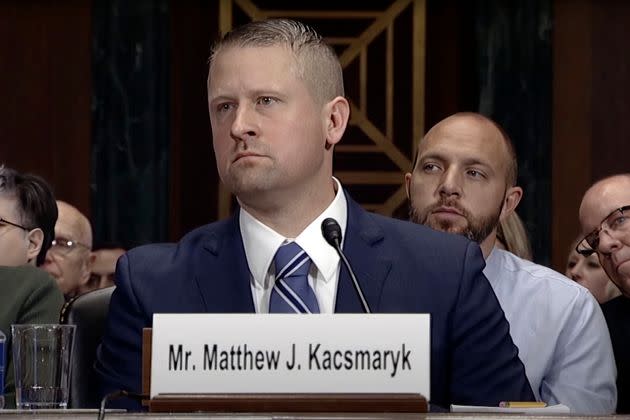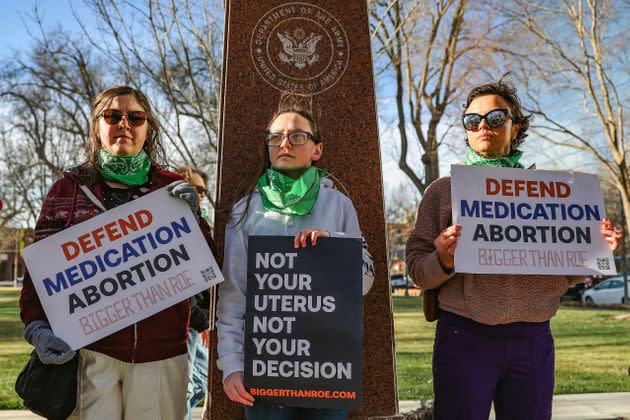The Hidden Radicalism Of The Abortion Pill Ruling: A Nationwide Abortion Ban
Tucked into a Texas judge’s decisionto invalidate the federal approval of the medical abortion drug mifepristone is a much more sweeping goal: the implementation of a nationwide ban on all abortions.
The decision by U.S. District Judge Matthew Kacsmaryk in Texas contains two arguments that could lead to a full nationwide abortion ban. First, Kacsmaryk opens up the possibility of providing all prenatal stages of development with personhood rights by insisting on describing zygotes and fetuses as an “unborn human” or “unborn child.” Second, and less directly, the judge invokes the 1873 Comstock Act in support of banning the distribution of any materials or products to promote abortion.
Despite the U.S. Supreme Court’s insistence that it was returning the issue of abortion to the states in its 2022 decision in Dobbs v. Jackson Women’s Health Organization, the anti-abortion movement has always sought a national ban on abortion. The anti-abortion movement was founded in the 1960s with the goal of enacting a nationwide ban on abortion. That started with a push for a constitutional amendment, but when that foundered, the movement shifted to judicial remedies, including overturning Roe v. Wade, the 1973 decision that legalized abortion, and finding “prenatal personhood” rights through the 14th Amendment.
Judges looking to push the law in a particular direction often introduce new arguments in decisions that others can build on in the future. Kacsmaryk does exactly that in his decision in the mifepristone case. Kacsmaryk seeks out prenatal personhood with his unusual definition of all entities in prenatal stages of development as “unborn humans.” This should come as no surprise, as Kacsmaryk was an anti-abortion activist before President Donald Trump nominated him for the federal court in 2017. His decision is peppered with anti-abortion rhetoric, calling doctors “abortionists,” and it relies on anonymous posts on an anti-abortion movement website to frame abortion as a dangerous practice for women.

Judge Matthew Kacsmaryk laid out new pathways to ban abortion nationwide in his decision to revoke FDA approval of mifepristone, part of a two-drug combination used for medication abortions.
There is likely little appetite on the Supreme Court for establishing prenatal personhood rights, as this would go much further than the court did in Dobbs when it nullified Roe. This makes Kacsmaryk’s other attempt to introduce a new argument to ban abortion nationwide all the more important.
Kacsmaryk’s decision overriding the Food and Drug Administration’s approval of mifepristone and the government’s authorization of its distribution through the mail relies on the 150-year-old anti-vice law known as the Comstock Act. The law was passed at the height of the Victorian Era after a campaign by Postal Service inspector and anti-vice crusader Anthony Comstock sought to ban the distribution of obscene materials offensive to public morals. These materials included everything from pornography and erotica to advertisements, promotions and educational materials about abortion and contraception.
States followed suit by passing their own Comstock laws. These state laws were routinely used to silence reproductive rights advocates, including Planned Parenthood founder Margaret Sanger. In a protest of her silencing, Sanger appeared in public with her mouth covered while historian Arthur Schlesinger Sr. read aloud the speech she was banned from giving.
Enforcement of the Comstock Act fell out of favor as public attitudes changed and the courts removed certain materials from its purview. In 1960, a court decision ended the Comstock Act’s ban on the distribution of obscene materials when it allowed Grove Press to distribute the D.H. Lawrence novel “Lady Chatterley’s Lover” over the long-held objections of the U.S. Postal Service. After the Supreme Court’s 1965 decision in Griswold v. Connecticut legalized contraception, Congress repealed the Comstock Act’s relevant provisions in 1971.
The provisions of the Comstock Act covering abortion remained in place, but the federal government has interpreted these provisions to allow for the mailing of abortion drugs so long as they are not meant to be used “unlawfully.” Kacsmaryk’s decision aims to eviscerate that protection.

Three women protest the case challenging the distribution of mifepristone prior to U.S. District Judge Matthew Kacsmaryk's decision.
“The statute plainly does not require intent on the part of the seller that the drugs be used ‘unlawfully,’” Kacsmaryk writes. “To be sure, the statute does contain a catch-all provision that prohibits the mailing of such things ‘for producing abortion, or for any indecent or immoral purpose.’”
Kacsmaryk’s application of the Comstock Act here could apply to any item procured through the mail or by other transportation for the purpose of carrying out an abortion.
“No abortion method exists in the United States that does not use something ‘designed, adapted, or intended for abortion’ and sent through the mail or via another carrier,” Mary Ziegler, a law professor at the University of California, Davis, writes in The Atlantic. “Abortion clinics do not make their own drugs or devices; they order these items from pharmaceutical distribution companies and medical equipment suppliers. Taken to its logical conclusion, Kacsmaryk’s ruling means that all abortions already violate criminal law.”
The Biden administration has filed an appeal of Kacsmaryk’s opinion to the U.S. Court of Appeals for the 5th Circuit, which is stacked with hard-right Trump appointees. This case will wind up before the Supreme Court sooner rather than later, and some of its conservatives, who did promise this issue would be left to the states, may find it too extreme to endorse.
Still, Kacsmaryk’s resurrection of the Comstock Act shows that overturning Roe was not the end goal of the anti-abortion movement. They will not accept anything less than a full nationwide ban, no matter how much that may upset Republicans squirming about the difficult political position that puts them in when a majority of Americans support abortion rights.
